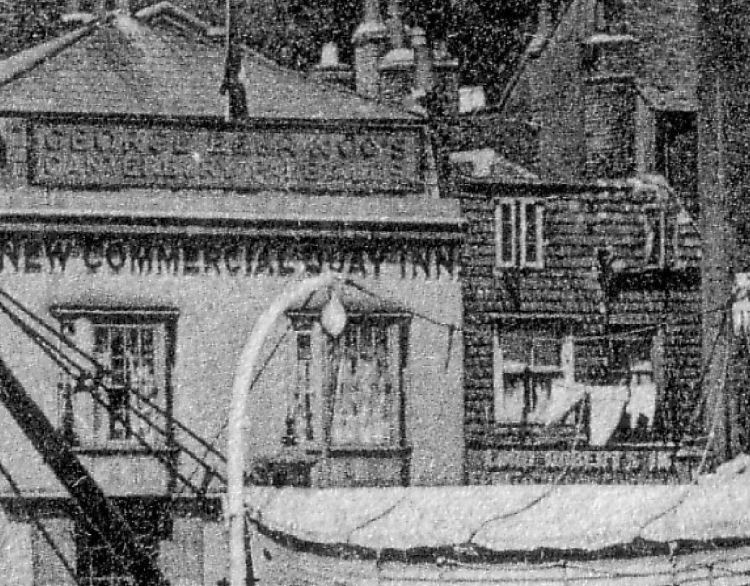|
From the Dover Express and East Kent News, Friday, 16 February, 1906. Price 1d.
OBJECTION TO THE LORD ROBERTS
The objection to the license of the “Lord Roberts” on the ground that in
the interests of the public it was unnecessary was next taken. The
landlord was George Sanders, and Mr. Mercer appeared for the tenant and
owner.
Inspector Fox said that the house had a back entrance to Commercial
Quay, and it was opposite the Shaft. Mr. Sanders had held the license
since March 1889. It was first called the “Sir Garnet Wolseley,” then
the “Lord Wolseley” and then the “Lord Roberts.”
Mr. Mercer: Such is popularity. (Laughter.)
Inspector Fox then went on to describe the number of licensed houses in
the vicinity, as given in the last case.
Cross-examined by Mr. Mercer: The house was very straight in front of
the Shaft.
You said you considered a church on the opposite side rather than
against a house?
Yes.
Do you consider the position as far as the Shaft is concerned against,
or in favour of the trade?
The house is frequently used by soldiers.
The Magistrates' Clerk: The Wesleyan Church is on the opposite side of
the road. (Laughter.)
Mr. Mercer, with astonishment: It must be very small. I failed to
mention it. (Laughter.)
You said what was said last year in the Court of Appeal. That there must
be a beginning somewhere. I do not know whether you read the case. The
Court of Appeal said that was not a good reason. Do you know that the
law laid down by the Court of Appeal is that there must be evidence
called to differentiate houses?
I have not read that.
Witness in reply to further questions said that if it were called upon
to choose the house to be opposed, the trade done and the number of
changes would the location be considered? The present tenant had been in
the house twenty years. He did not know the previous tenant had been
there 11 years but he knew he had been there a good many years. He did
not think he could point to a house in that block that had had a tenant
one tenth of that time. He did not think he had heard that one of the
house in the block, during the last 18 years had changed hands 20 times,
but some of them had changed very frequently.
Mr. Mercer suggested that the “Mitre” changed hands from 15 to 16 times
during the last 20 years and on witness examining the register, he said
it had changed hands 16 times since 1888. he also found that the
“Ordnance” had changed 14 times since 1882.
In reply to further questions, witness said that he was afraid he could
not point to many tenants of practically 20 years standing in Dover. He
had, however, been in trouble in 1894. Years ago the house had been a
source of trouble to the Police, and it had been out of bounds to the
Military once.
Mr. Sanders said that was 12 years ago.
Mr. Mercer, in addressing the Magistrates, said that he was not going to
suggest that there were too many houses in Dover. The state of trade
during the last few years was a remarkable one. The returns just come
out, showed that since the War tax in 1889, the beer trade had fallen
one eighth, and the spirit trade one fifth throughout the whole of
England, due to the lesser spending power of the people, or to the
efforts of the Temperance party, although he attributed it more to the
former reason. Referring to the Drinkwater case recently decided by the
Court of Appeal he urged that no sufficient reason had been shown for
the Magistrates to refuse to renew the license, especially in view of
the fact that there had only been two tenants in 30 years; and this
house, moreover, had in fact, during the last year, increased its trade
by about 20 barrels, and he would ask the Magistrates to say that from
the position of this house, and in consequence with others, that there
was a public need for this house to me maintained.
THE MAGISTRATES DECISION
After a short consultation in private, the Magistrates turned to the
Bench. The Chairman said “The following houses will be referred to the
Kent Compensation Committee of the Quarter Sessions in due form: The
“William and Albert,” The “Three Compasses,” the “Wellesley Inn,” the
“Old Commercial Quay,” the “Duke of York,” and the “Half Moon.” The
licenses for these houses will run until the time when the compensation
is paid, and then the licences will cease. With respect to the
“Devonshire Arms” and the “Lord Roberts,” and the “Nottingham Castle,”
they will be withdrawn from the list.- These licences will be renewed in
the ordinary way.
|
